Spanish journalist Pablo González Yagüe has been released from prison in Poland after being detained since February 2022 on accusations of spying for the Kremlin. His release came as part of a prisoner exchange between the US, its European allies, and Russia. Evan Gershkovich, a correspondent for The Wall Street Journal in Moscow, was also freed in the exchange. González, who denies collaborating with the Putin regime, has been transferred to Russia after the exchange took place in Ankara, Turkey. His family’s statement emphasized the humanitarian reasons behind his release.
González was arrested in Poland under suspicion of working for Russia during the conflict in Ukraine but was never formally charged. He had been held in a high-security cell in Radom prison and was subjected to harsh conditions, with limited outdoor time and little contact with the outside world. International organizations like Reporters Without Borders and Amnesty International had raised concerns about his treatment and called for more transparency regarding the charges against him. Despite having dual Spanish and Russian citizenship, Polish authorities viewed him with suspicion due to his family ties in Russia.
González’s arrest and imprisonment had strained relations between Spain and Poland, with his family criticizing the Spanish government for not doing enough to secure his release. They claimed that President Pedro Sánchez had not devoted enough attention to the case and that Foreign Minister José Manuel Albares had only offered limited support. The family also expressed frustration with the lack of progress in resolving the situation, despite efforts from Spanish diplomats to assist González during his imprisonment.
The exchange that led to González’s release was part of a larger diplomatic effort to free individuals held in Russia and Poland. The focus on humanitarian reasons in the negotiations highlights the importance of protecting journalists and their rights in conflict situations. González’s case underscores the challenges faced by reporters working in sensitive regions and the need for greater support and advocacy for press freedom. His family has expressed gratitude for his release and hopes that he can now speak publicly about his experiences.
As González returns to Russia, his homeland, he faces the challenge of rebuilding his life after nearly two and a half years of imprisonment. The ordeal has taken a toll on him and his family, but they remain hopeful for the future. The role of journalism in shedding light on conflicts and holding those in power accountable is crucial, and González’s experience serves as a reminder of the risks involved in this profession. Moving forward, it will be important to continue advocating for press freedom and protecting the rights of journalists worldwide.


